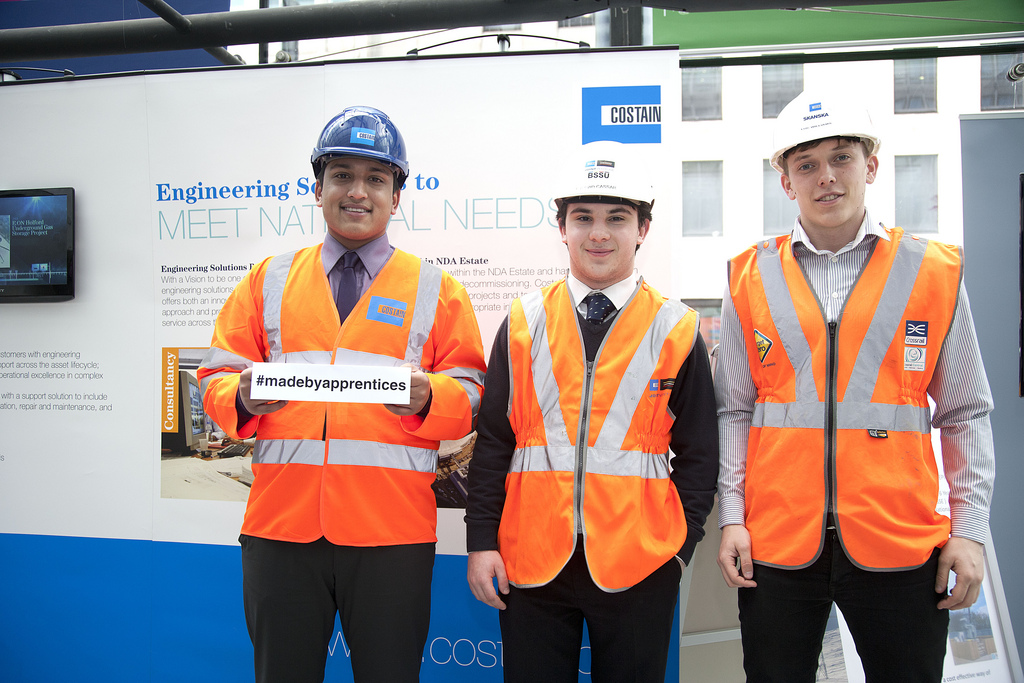With Millennials expected to make up 40 percent of the national labor force by 2020 and 75 percent by 2025, it’s not surprising that employers are rethinking old methods of how to attract young people to their companies. Competitive salaries alone aren’t enough to attract most workers, and “Gen Yers” have watched older generations struggle to balance work and personal life and don’t want to fall into similar patterns. While they may not expect companies to change their cultures or processes to accommodate them, Millennials may steer clear of industries that seem too corporate, stagnant or slow to innovate. As a result, many organizations are waking up to this shift of expectations and are reshaping company cultures, redefining values and creating a nurturing environment for innovation.
Manufacturing especially is one sector that struggles to attract skilled laborers – 28 percent of manufacturers in Georgia agree. Despite the number of job seekers far exceeding the number of manufacturing jobs available, finding workers with the right skill sets remains a serious challenge for those in leadership and hiring positions.
And this is an even bigger problem than it was three years ago. According to the Technology Association of Georgia’s (TAG) Decision Maker Survey, more than 72 percent of respondents identified access to skilled labor as the most important factor to grow Georgia’s innovation economy.
For more than a century, Americans have forwarded innovation, transforming how we conduct business, build infrastructure and produce goods, upsetting society over and over again as we discover new and improved technologies. We lead the world in creating disruptive innovations, opening new markets with a voracious appetite. However, we are far out-paced in innovating within existing markets by competitive nations. This has industry leaders wondering how manufacturers will attract a Millennial workforce. Here are five focus areas for investment that will help manufacturers engage and attract Millennials with the right skills and leadership qualities to their organizations.
Telling a New Story
We know industry incumbents often find it difficult to innovate, but when presented new ways of satisfying customers or channel partners, they will put adequate R&D resources behind innovation efforts. But it’s generally because the need for innovation was brought to their attention by outside influences – either from suppliers, customers or those specializing in technology.
Many industry leaders have already realized the need to bring these innovators in-house, provide them with resources to bring their operations into a new era of technological advancement and create cultures that encourage employees to put forth new ideas. Millennials represent an incredible talent pool when it comes to being tech-savvy, championing innovation and thriving in creative, inventive cultures.
How will manufacturing brands appeal to this generation of forward-thinking workers that will soon make up the bulk of our nation’s workforce?
By retelling their companies’ stories.
According to findings by ThomasNet, 45 percent of manufacturing company executives believe Millennials view manufacturing to be a “dirty, blue-collar industry.” At a time where parents push their children toward prestigious careers in medicine, law, education, business, etc., U.S. manufacturers need to broadly communicate high-paying jobs within industries that value and reward innovative thinking, especially in terms of production and supply chain management software, product design, 3-D printing, automation and robotics.
Millennials thrive in organizations that cultivate cultures of innovation, value corporate social responsibility, embrace technological advancement and provide mentorship and career development. They also want to work for organizations that are open and transparent about their business operations. Unfortunately, these expectations are negatively impacting Georgia’s skilled labor force. The migration of Millennials to Georgia has decreased significantly in the last year – by six percent according to the TAG Decision Makers Survey. So it is up to the leadership of these organizations to publicly champion compelling reasons why careers in manufacturing are attractive alternatives to professions within corporate America, and why their corporate values align with professional aspirations of Millennials.
Focus On Innovation
Positioning your company as a leader of innovation is paramount to attracting Millennial talent. Though only eight percent of respondents surveyed by Deloitte said that how innovative a company is “strongly influenced” their decision to work at that company, they are looking to company “leaders for strategic thinking (39 percent), inspiration (37 percent) and vision (31 percent).” Many of Millennials (63 percent) believe management is often the biggest barrier to innovation, and will actively go out of their way to avoid working for executives who do not foster innovation within their organizations.
Opportunities to impact innovation in supply chain solutions, plant automation, machine-to-machine communications and Internet of Things will attract Millennials to Georgia’s industries.
A culture of innovation often indicates a company has also prioritized other values that are important to Millennials. Statistically, Georgia manufacturers who encourage innovation also offer higher wages, employee visibility and upward mobility, as well as practice transparent communications from the top down and sustainable responsibility across all business units.

“Values don’t stop or start when you get into the office or go home; they are part of you and what you are passionate about.” – Simon Cohen, Consultant and contributor to Harvard Business Review, Entrepreneur Magazine and Huffington Post.
Sixty-two percent of Millennials want to work for an employer that makes a positive impact. All employees, not just Millennials, want to work for “the good guys” and 6 out of 10 Millennials cite having a “sense of purpose” as one of the criterion for choosing an employer. They believe business has not only the ability, but the responsibility to positively impact society, and they want to align themselves with corporations that share those beliefs. Knowing their daily work contributes to the betterment of society is an important factor for determining future workplace satisfaction.
While universally manufacturers prioritize sustainability as one of their core values, only nine percent of Georgia’s manufacturers have conducted emission inventories of their carbon footprint.
This generation, more than any other predecessor, will look for companies that offer sustainable solutions in their personal and professional lives. Brands must stand for more than just profits if they are to engage this generation.
Focus On Technology
Integration of technology in the workplace is a must for Millennials. As the first generation to grow up in a digital world, Millennials have mastered how to use technology to socialize, multi-task, and collaborate, among others, and they expect to take those technologies into the workplace. Seventy-five percent believe access to technology makes them more effective on the job. Even more telling, 59 percent consider whether or not an employer provides state-of-the art technology when considering a job.
Companies that want to attract this tech-savvy generation must adapt to those needs and embrace new methods of performing routine tasks that may not have evolved in decades. This also offers Millennials the opportunity to share their technical knowledge with older generations in the workplace, increasing inter-personnel communications and bringing employees closer together while streamlining new processes across business units.
Digital Relevancy – Don’t discount the power of a strong social media presence for your brand. The first thing a Millennial will do in researching potential employers is Google your brand and visit your social media properties. Digital relevancy is critical to engaging the generation that invented Facebook, Twitter, Instagram, etc.
Focus On Career Development
Millennials believe businesses across all industries do not do enough to nurture their careers. By their own admission, 29 percent of Georgia’s manufacturers spent no money on training in 2013. Among manufacturers that did spend money on training, the median respondent reported spending only ten percent of training dollars on new activities and tasks (i.e., not routine training). Only 20 percent spent more than 50 percent of their training dollars on new activities and tasks. Small manufacturers not only spent less, but virtually all of their spending was for routine training.
Fifty-eight percent of Millennials expect employers to provide them with learning opportunities relevant to their jobs.Manufacturers should capitalize on this opportunity to stand out with potential hires by offering professional training such as setting long-term career goals, how to approach a senior team member for mentorship, processing feedback, etc.
Millennials work best in a collaborative, team environment where information is shared across projects and teams. Fostering open communications and providing regular coaching and feedback is critical to keeping Millennials engaged – even if that regular coaching is a short email or quick two–to–three minute weekly touch-base.

Focus On Transparency
Encouraging dialog with all levels of employees will help negate the distrust many Millennials tend to feel toward big business. Most employees, not just Millennials, expect their leadership to communicate openly. It’s critical to building trust within an organization, as well as engagement. Openly communicating compensation decisions and career development will go a long way, as will creating rewards structures that take into account all manners of employee contributions.
According to Ron Piccolo, PhD., Cornell Professor of Management and Academic Director for the Center for Leadership Development at the Rollins College Crummer Graduate School of Business, “Millennials are a generation of storytellers and they’ll happily amplify the great things your business is doing through their own social media platforms.”
Millennials will advocate for your brand across their favorite channels, but only if they believe in the overall message of your company. Having happy Millennials in the workplace can lead to a boost in your company’s social media presence.
Conclusion
There are many assumptions and myths associated with Millennials, some more grounded in reality than others. Like any of us, Millennials want to be challenged while on the job and to feel like their contributions matter to the over-all success of your company. Companies that embrace engaging the workforce of the future will see greater return in terms of growth, emerging revenue streams and industry leadership.
Providing Millennials with the flexibility, tools and corporate value structure they can support and feel good about is key to engaging them.
Reference
1.The Georgia Manufacturing Survey: Making it in the Global Economy, 2014
2.UNC Kenan-Flagler Business School, Maximizing Millennials in the Workplace, 2012
3.Deloitte Millennial Survey Report, 2014
4.Technology Association of Georgia Decision Maker Survey, 2015
5.Technology Association of Georgia State of the Industry Report, 2015


